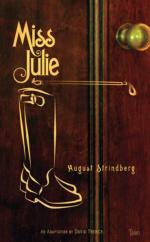|
This section contains 337 words (approx. 1 page at 400 words per page) |

|
Calling Strindberg's drama "more a pathological curiosity than a clear and moving play," Gibbs nevertheless offers a positive appraisal of this 1956 production.
Miss Julie is something, and with bells on, as the pretty saying goes. The heroine's mind is the battleground for a hundred waning impulses, inherited from a family of distinguished peculiarity, and her behavior, to put it very mildly, is bizarre. She is an incurable aristocrat who hates the idea of class distinctions, a passionate woman (the performance at the Phoenix suggests nymphomania, but I doubt if that was the author's intention) who has a horror of men, an idealist ceaselessly, corrupted by her senses. It is apparently Strindberg's contention that no tragedy has a single, pat explanation, and Julie's ultimate suicide, coming as the climax of her grotesque affair with her father's valet, surely bears this out. She is a figure of infinite complexity...
|
This section contains 337 words (approx. 1 page at 400 words per page) |

|




